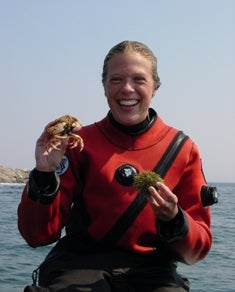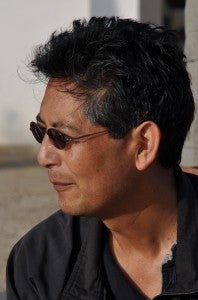Amanda Leland, EDF’s National Policy Director for the Oceans Program, is a passionate environmental and policy specialist working to protect and offer innovative solutions to the nation’s oceans and fisheries. Learn more about her experience and background in our series of interviews with EDF’s passionate and talented Oceans staff.
Where did you grow up?
Near Plymouth, Massachusetts. My ancestors actually came here on the Mayflower.
Who introduced you to fishing?
My great-grandfather was a lobster fisherman in Manomet, Massachusetts. He passed his love of fishing on to my grandfather who always took me out on the water to fish for striped bass and bluefish. He taught me how to captain his 24’ boat when I was 8 years old. I loved the ocean. If I wasn’t on his boat, I was at the beach.
When did you become interested in environmental issues?
I’ve always been interested in the environment. For example, my 7th grade science fair project was about how much trash could be recycled. I became an EDF member when I was thirteen, and I paid my annual dues with my birthday money.
At one point you were studying to be a marine biologist, is that correct?
Yes, I got my Master’s in Marine Biology at the University of Maine. Before that, I did a year-long marine biology program when I was a junior in college. Our time was split between Boston, the Puget Sound and Jamaica. We were in the water a lot and I had my first scuba-diving experience in Friday Harbor, Washington. I’ve now logged 500 dives!
Also when I was in graduate school, I was researching how to bring back Maine’s sea urchin population. Sea urchins were once Maine’s 2nd most valuable fishery but overfishing changed that. I worked with a team of fishermen to hand collect and move 54,000 sea urchins to our study sites. In the process we all got so many splinters from the urchin spines, we started carrying tweezers. Still, we all enjoyed the work. A fisherman once said to me, “You got me to work 15 hours today and I didn’t even notice it.”
What made you decide to work on policy versus being in the field as a biologist?
Several sea urchin fishermen I met told me, “If I don’t catch the last sea urchin someone else will.” There’s such finality in that statement. I decided I wanted to try to improve management so that fishermen aren’t forced to choose between conserving the resource and feeding their kids. We have to reward fishermen for restoring fisheries.
What do you do at Environmental Defense Fund?
I lead a team focused on improving fisheries management at the federal level. We work with Congress and the Administration to move conservation policy forward. We were very happy to see NOAA announce a policy to help more fisheries move to catch shares, an innovative way to manage fisheries that will help bring back depleted fish populations and make fishermen once again profitable.
The way we’re fishing now is not sustainable and the way we are managing fishing is not working. Something has got to give. With catch shares, we can have vibrant fishing communities and healthy fisheries at the same time.
What’s something most people don’t know about you?
I have bottle-fed walruses. When I was in high school and college, I worked at the Indianapolis Zoo as a marine mammal zookeeper. I took care of the polar bears, baby walruses and sea lions. I sorted through hundreds of pounds of fish every morning to get their food ready.
Another thing people don’t know about me is that I once ate 5 pounds of lobster in one sitting on a dare. I love seafood.
Never miss a post! Subscribe to EDFish via a email or a feed reader.











